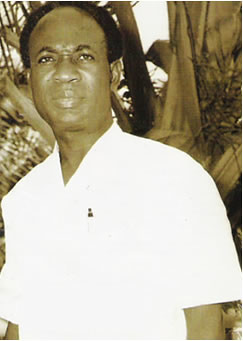
Co-President of Guinea Kwame Nkrumah in Conakry after the 1966 military coup in Ghana. Nkrumah lived in Guinea from 1966-1971., a photo by Pan-African News Wire File Photos on Flickr.
Friday, 17 May 2013 00:00
African Executive
The Africa Union is 50 years old. Hurray! In the coming days, African leaders are expected to gather in Addis Ababa.
Many of them will deliver speeches upon speeches, paying respect to the founding fathers of the organisation. We will be reminded of how our
forefathers fought hard to overthrow colonial regimes and established the Organisation of African Unity and how a successful AU has finally been established, although Africa still remains politically divided than before.
Ideally, one would expect that after such sessions, leaders will sign a declaration that will give a true meaning to the dreams of the founding fathers of the AU.
However, knowing the kind of lip service often paid by modern African leaders, one can only assume that the 50th anniversary celebrations will not be any different.
The session may end as one of the usual “tea conferences” without any serious commitment to a politically united Africa, a common African market, a single currency, an African Central bank, a common foreign policy, a common defence system and a common citizenship amongst others.
Fifty years ago, our founding fathers outlined the following as key priorities (emphasis added): “We all want a united Africa, united not only in our concept of what unity connotes, but united in our common desire to move forward together . . .
Currently, Africa is clearly fragmented into too many small uneconomic and non-viable States, many of whom are having a very hard struggle to survive. An all-African planning body could take immediate steps towards the development of large scale industry and power; for the removal of barriers to inter-African trade; and for the creation of a central bank and the formation of a unified policy on ALL ASPECTS of export control tariffs and quota arrangements.
Among immediate needs is the manufacture in Africa of agricultural machinery of all kinds to speed up the modernisation of agriculture. We need supplies of reliable electric power for industrial growth . . . The advantage of unified military and diplomatic policies, both for our own security and to achieve freedom for every part of Africa, is so obvious as to need no comment.
Transport and communications are also sectors where a unified planning is needed. Roads, railways, waterways, air-lines must be made to serve Africa’s needs, not the requirements of foreign interests.” Kwame Nkrumah (Neo-Colonialism, excerpts from chapter 2).
It was against this backdrop that the African Union was established in May 1963. It was a time when many African states were gradually emerging from the firm grip of barbaric colonial regimes. As a reminder to our generation, Patrice Lumumba puts it best in his first ever speech as Prime Minister of the Congo:
“Who will ever forget the shootings or the barbarous jail cells awaiting those who refused to submit to this (colonial) regime of injustice, oppression and intimidation?” But how many of the African youth really know about the true history; how their forefathers shed their blood with the hope to achieve a truly free, united Africa? Unfortunately, to many Africans, the fact that we do not know why the AU was established is not a big deal. We have surrounded ourselves with thick colonial borders.
50 years ago it was said that, “Transport and communications are also sectors where a unified planning is needed.” Why couldn’t Africa adopt a unified custom policy that allows for the sharing of information to facilitate the swift movement of people, goods and services across borders?
In 2012, in one of my discussions titled: “Intra-African Trade Is Possible But . . . ” I came up with the some recommendations which were duly copied to the AU and the Pan-African Parliament:
“Ideally, it would be more appropriate for African leaders to abolish the visa restrictions altogether so that all Africans can travel easily to any African territory without having to acquire a visa.
In the meantime, African leaders must also consider the issuing of Regional Visas (Ecowas Visa, EAC Visa, Sadc/Comesa Visa, etc) and abolish the individual country visas.
This would also enable foreign investors/visitors the opportunity to visit many African countries on a single visa while avoiding all the long visa queues at the various African embassies. The European Union currently has such a system in place where citizens of the ‘third world’ can acquire the Schengen visa and travel to as many EU countries as possible.”
Some few weeks after these recommendations were sent; the Pan-African Parliament came out with more speeches, explaining how such a measure could help move the continent forward. Most importantly, even the AU’s theme for last year was “Boosting Intra-African Trade.”
Yet, after one year of setting up various “committees for deliberations,” what happened to the above recommendations? Are these recommendations not worth implementing in our quest to boost Intra-African Trade? When will our leaders commit themselves to their own words and the very principles that will bring economic relief to our people?
Unfortunately, this is the very reason why we have failed to get to the promised land after 50 years. A people without sound knowledge of their history are doomed to repeat it. This is where we stand as a people. The solution to all our problems was well-documented by our founding fathers — yet, we still have no idea what to do to move forward.
Long live the African people.
Long live the African Union that must be.
— African Executive
No comments:
Post a Comment